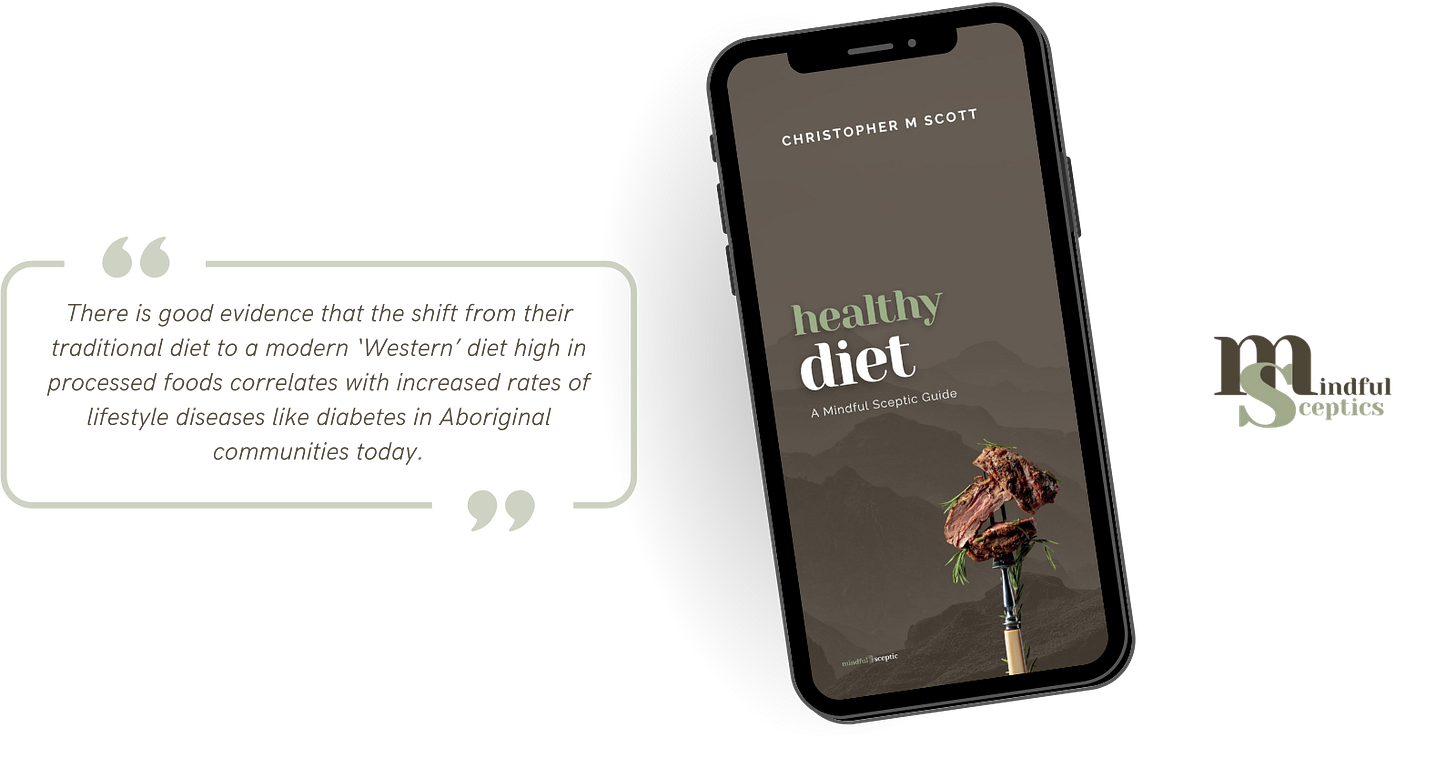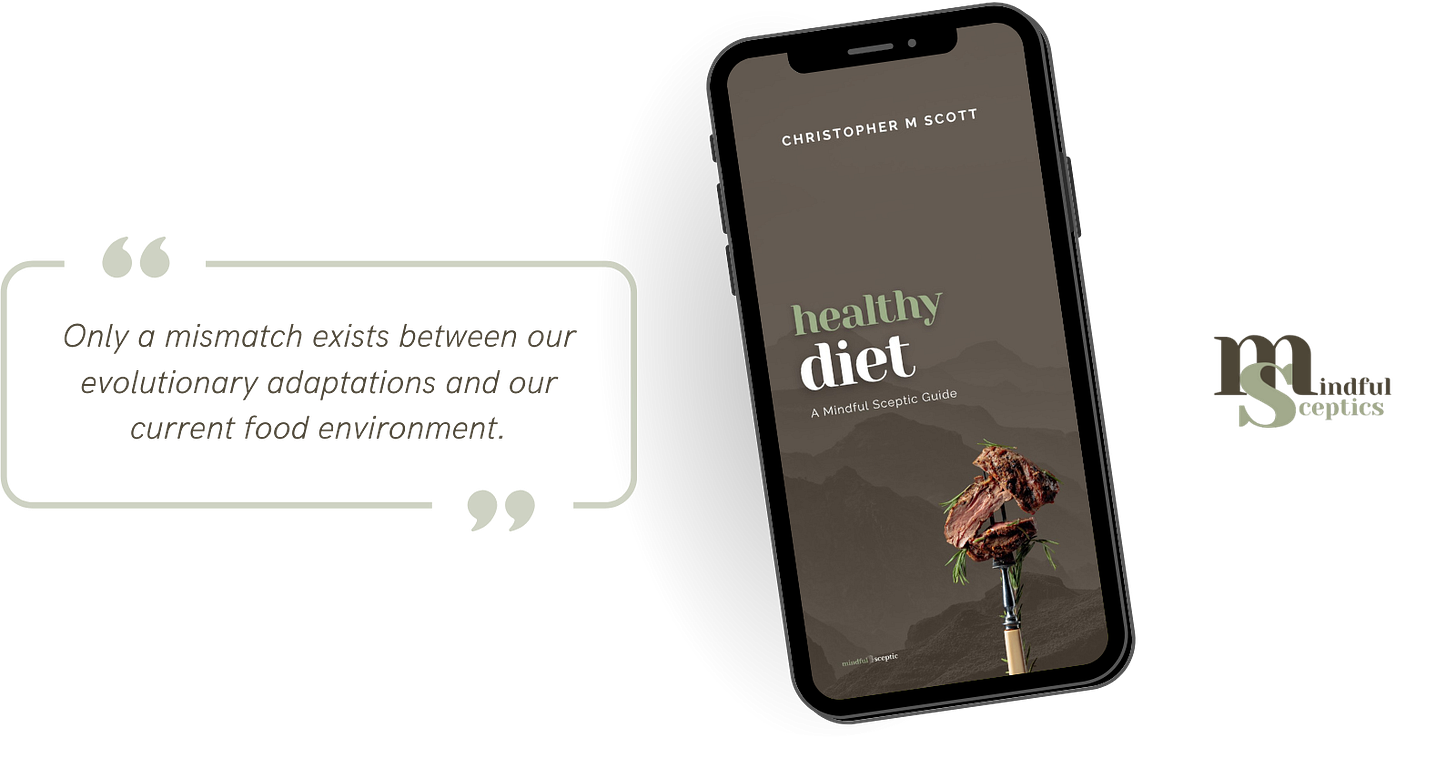Core Idea
Most of us trust nutritional science to guide our food choices.
We count calories, follow food pyramids, and chase the latest dietary guidelines as if they’re carved in stone. And because we believe that what the health authorities tell us to eat is based on studies conducted over decades, the logic must be sound. Surely centuries of human progress have taught us how to feed ourselves properly.
But there’s a fundamental flaw in this thinking.
Modern dietary advice treats humans as if we’re laboratory specimens who can adapt to any fuel source, ignoring the inconvenient truth that our bodies spent 290,000 years evolving on foods that barely exist in our current food environment.
Counterpoint
The illusion here is that nutritional science, despite its impressive research apparatus, has figured out optimal human nutrition by focusing on nutrients in isolation rather than the foods our species actually thrived on.
The reductionist approach of most research, which breaks down food into protein, fat, and carbohydrate percentages, misses the bigger picture entirely.
Consider the timeline.
Homo sapiens existed for roughly 290,000 years before agriculture arrived 10,000 years ago. Ultra-processed foods have been mainstream for perhaps 50 years.
Yet current dietary guidelines treat these recent additions as normal, even essential. A health star rating system awards four stars to margarine and gives butter half a star, even though butter has been consumed by humans for millennia, whereas margarine was invented in a laboratory.
This isn’t just academic hairsplitting.
Traditional Inuit populations thrived on diets that were 85% fat, with virtually zero carbohydrates from grains.
Aboriginal Australians lived successfully for 65,000 years without wheat, dairy, or vegetable oils—yet government dietary recommendations now insist these foods are essential for their health.
Meanwhile, diabetes rates among Aboriginal communities have skyrocketed since adopting Western diets, reaching 3-5 times higher than the general population.
The mismatch goes deeper than individual foods.
Our physiology evolved expecting irregular, nutrient-dense meals from hunting and gathering. We developed strong preferences for fat, salt, and sugar because these were scarce and vital for survival. Today’s food industry exploits these ancient drives, creating hyper-palatable combinations our ancestors never encountered.
We’re running stone-age software on a space-age food environment.
Thought Challenge
Examine your own pantry through an evolutionary lens… Calculate what percentage of your stored food existed 200 years ago versus what’s been invented in the last century. Look at ingredient lists and make a guess at how many components your great-great-grandmother would have recognised as food?
Research the health outcomes of populations who’ve shifted from traditional to Western diets within recent generations… Compare diabetes, obesity, and cardiovascular disease rates in these communities before and after dietary change. Notice the pattern that emerges consistently across different cultures and continents.
Closing Reflection
The most profound medical insights often come from stepping back rather than drilling down.
While nutritional science searches for the perfect combination of processed nutrients, perhaps the answer lies in the simple recognition that human biology isn’t infinitely adaptable.
We are what 290,000 years of evolution made us, not what 50 years of food technology assumes we can become.
Sometimes the most radical act is remembering what we already knew.
Evidence Support
Assaf, S., Park, J., Chowdhry, N., Ganapuram, M., Mattathil, S., Alakeel, R., & Kelly, O. J. (2024). Unraveling the evolutionary diet mismatch and its contribution to the deterioration of body composition. Metabolites, 14(7), 379.
TL;DR… evaluates how replacing whole foods with ultra‑processed ones disrupts the “evolutionary metabolome”—the complex mix of holistic compounds humans evolved with. It argues that loss of this biochemical diversity contributes to adiposity, muscle loss, and rising chronic diseases.
Relevance to insight… supports the insight by framing the ultra‑processed diet as an evolutionary mismatch. It connects nutrient simplification and immune‑metabolic imbalance to the loss of evolutionary coherence between human physiology and food ecosystems.
de Miranda, R. C., Rauber, F., & Levy, R. B. (2021). Impact of ultra‑processed food consumption on metabolic health. Current Opinion in Lipidology, 32(1), 24–37.
TL;DR… consistent associations between higher ultra‑processed food intake and metabolic syndrome, obesity, type 2 diabetes, hypertension, and cardiovascular disease. The strongest evidence comes from large adult population cohorts.
Relevance to insight… ultra‑processed food affects metabolic systems far beyond its calorie content, reinforcing that processing intensity—not just nutrients—matters most for human health.
Lane, M. M., Davis, J. A., Beattie, S., Gómez‐Donoso, C., Loughman, A., O’Neil, A., ... & Rocks, T. (2021). Ultraprocessed food and chronic noncommunicable diseases: a systematic review and meta‐analysis of 43 observational studies. Obesity reviews, 22(3), e13146.
TL;DR… consistent associations between ultra-processed food consumption and increased risks of overweight, obesity, all-cause mortality, metabolic syndrome, depression, and several chronic diseases. The review quantifies these risks across diverse populations and highlights an evident link between UPF intake and adverse health outcomes.
Relevance to insight… shift to diets rich in ultra-processed foods—an evolutionary novelty—substantially raises disease risk, providing a direct empirical window into the mismatch between modern eating patterns and human physiological adaptation. It delivers strong, population-level evidence matching the insight that a move away from ancestral dietary ecology drives a global explosion in lifestyle diseases.
Lea, A. J., Clark, A. G., Dahl, A. W., Devinsky, O., Garcia, A. R., Golden, C. D., ... & Ayroles, J. F. (2023). Applying an evolutionary mismatch framework to understand disease susceptibility. PLoS biology, 21(9), e3002311.
TL;DR… research applying the evolutionary mismatch hypothesis, showing that humans evolved for environments and diets radically different from today, resulting in physiological stress and the epidemic rise of obesity, metabolic syndrome, and allied disorders. It discusses processed foods and environmental shifts as major sources of modern ill health.
Relevance to insight… support for the evolutionary mismatch concept both in diet and broader lifestyle, demonstrating with examples (obesity, diabetes) how environmental and dietary shifts away from ancestral norms generate chronic disease. It is central for substantiating how current health crises arise from this biological-cultural disconnect.
Temple, N. J. (2024). Making sense of the relationship between ultra‑processed foods, obesity, and other chronic diseases. Nutrients, 16(23), 4039.
TL;DR… linking high consumption of ultra‑processed foods to obesity, cardiovascular disease, depression, cancer, and all‑cause mortality. It discusses mechanisms like hyperpalatability and high energy density that trigger overconsumption.
Relevance to insight… industrial processing reshapes human appetite and energy regulation, leading to diseases rooted in the body’s ancient physiological wiring, which evolved for scarcity rather than abundance.





